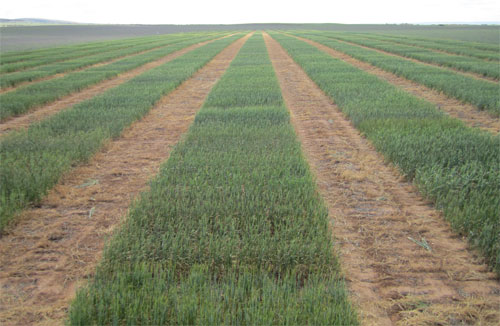Adelaide, South Australia
November 13, 2013

Saline site wheat and barley field trials at Whitwarta, South Australia
A new research project announced today will identify how bread wheat and barley can tolerate saline soils. The project, being funded by the Grains Research and Development Corporation will deliver resources to breeders for novel salinity tolerance traits for incorporation into their breeding programs. Salinity is estimated to affect approximately two thirds of Australian agricultural land.
The project utilises knowledge gained through past research projects and will identify the next generation of salinity tolerance traits to help farmers.
‘Importantly, experiments will not only take place in the greenhouse but also in the field to validate the effects of these salinity tolerance traits on grain yield,’ said Dr Stuart Roy, Program Leader at the Australian Centre for Plant Functional Genomics (ACPFG), based at the University of Adelaide’s Waite Campus. ‘The researchers will develop markers for novel salinity tolerance traits and then test the effect of these traits in field trials in SA, WA and ACT.’
The project, worth $2.5million over three years, is a collaboration between the ACPFG, the School of Agriculture, Food and Wine at the University of Adelaide, CSIRO Plant Industry (Canberra) and the University of Western Australia (Perth).
‘Introducing salinity tolerance in cereals is not straightforward as salinity causes multiple problems for the plant,’ said Dr Matthew Gilliham, project investigator from the University of Adelaide. ‘When salts build up in the soil they reduce plant growth and make it harder for plants to take up water. Salts can also accumulate in the leaves and damage the ability to plants to harvest sunlight. Our project is about discovering the best of what nature offers so we can offer that to our farmers.’
The collaboration between researchers across Australia provides a significant opportunity to make the optimal use of resources and available expertise to accelerate the development of salinity-tolerant crops.
About ACPFG:
The Australian Centre for Plant Functional Genomics (ACPFG), focuses on improving the resistance of crops to stresses that impact agriculture in Australia, including drought, salinity, high or low temperatures and mineral deficiencies or toxicities. These stresses, known as abiotic stresses, are a major cause of cereal crop yield and quality loss throughout the world. ACPFG’s head office is at the University of Adelaide’s Waite Campus.
Visit www.acpfg.com.au for more information.
About University of Adelaide:
The University of Adelaide is one of Australia’s leading research-intensive universities and is consistently ranked among the top 1% of universities in the world.